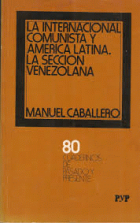
Part of Series
Umberto Cerroni Para una teoría del partido político Lucio Magri Problemas de la teoría marxista del partido revolucionari Monty Johnstone Marx y Engels y el concepto de partido
Authors


Monty Johnstone, who has died from complications following treatment for a burst ulcer, aged 78, was an admired, but for the most part lonely, presence in communist and socialist politics for half a century. He was indeed hard to overlook. The journalist Francis Beckett recalled him at the final congress of the Communist party in 1991 as "a tall, thin, imposing figure who ran his fingers through his long dark hair as he spoke and sounded like an eccentric history professor". More likely he will be remembered, looking genial and perennially youthful, cycling through London - his grandfather Sir John Foster Fraser had in 1896-97 been the first man to cycle round the world - on his way from one meeting to another to debate Marxist theory and developments in the Soviet Union and eastern Europe. Learned, a formidably multilingual traveller, as vocal about public matters as he was silent about private ones, and utterly indifferent to the comforts and conveniences of life, he seemed a modern secular version of a medieval scholarly friar. Born to CJS Montague Johnstone of the Royal Scots Greys and Margaret Fraser in Sir Walter Scott's house, Abbotsford, in Melrose, Monty joined the Young Communist League aged 12 in the unlikely milieu of Henley on Thames before going to Rugby school. After national service in Germany and communist agitation in the Hamburg dialect, he went up to Christ Church, Oxford, with a languages scholarship to study politics, philosophy and economics. After he graduated in 1952, he took a party job as editor of the Young Communist Challenge until his heterodoxy ended his party career in 1956. Perhaps he might have been happier as an academic. Monty was to remain a loyal but critical communist all his life, hostile to the dilution of socialist ideals but equally critical of the destruction of democracy in post-1917 Russia and the blind loyalty of communist parties to Moscow. Though he stayed in the party after 1956, he was viewed with suspicion, and the party press was closed to him until after the 1968 Soviet invasion of Czechoslovakia, during which, in Prague, he tried to dissuade embarrassed Russian tank crews in fluent Russian. Meanwhile in the CP, his anti-Stalinism pioneered what later became known as Eurocommunism. He also established a reputation among the 1960s New Left, and became associated with Ralph Miliband (obituary, May 23 1994) and Isaac Deutscher. By the 1980s, the ideological shift in the CP leadership brought Monty rehabilitation within what was by then a doomed party. He was finally put on the editorial board of the Collected Works of Marx and Engels and was even elected to the CP executive committee. However, he was unsympathetic towards the wholesale revisionism of Marxism Today. None the less, in 1980 - nobody quite knows how - he secured that newspaper the journalistic coup of a double interview in Poland with the leader of Solidarity, Lech Walesa, and prime minister Mieczyslaw Rakowski. He was pessimistic about Mikhail Gorbachev's reforms, opposed the dissolution of the Communist party of Great Britain, but kept a political home in the Socialist History Society, the Alliance for Green Socialism and various continental groups analysing the failures and might-have-beens of communism. In the late 1960s, Monty gave up a successful career teaching at Woolwich Polytechnic - now part of Greenwich University - for a freelance life of writing, lecturing in Britain and abroad (he was a powerful speaker), and bringing up his children. He had a contract for a major book on the development of Leninism, but never completed that or any other book, although he published numerous lucid and persuasive lectures. Following the break-up of his marriage in the early 1970s, he became in effect a single parent. After his children grew up and left, he sold the family house and lived increasingly in unadvertised and uncomplaining poverty in a south London flat without a telephone, analysing



